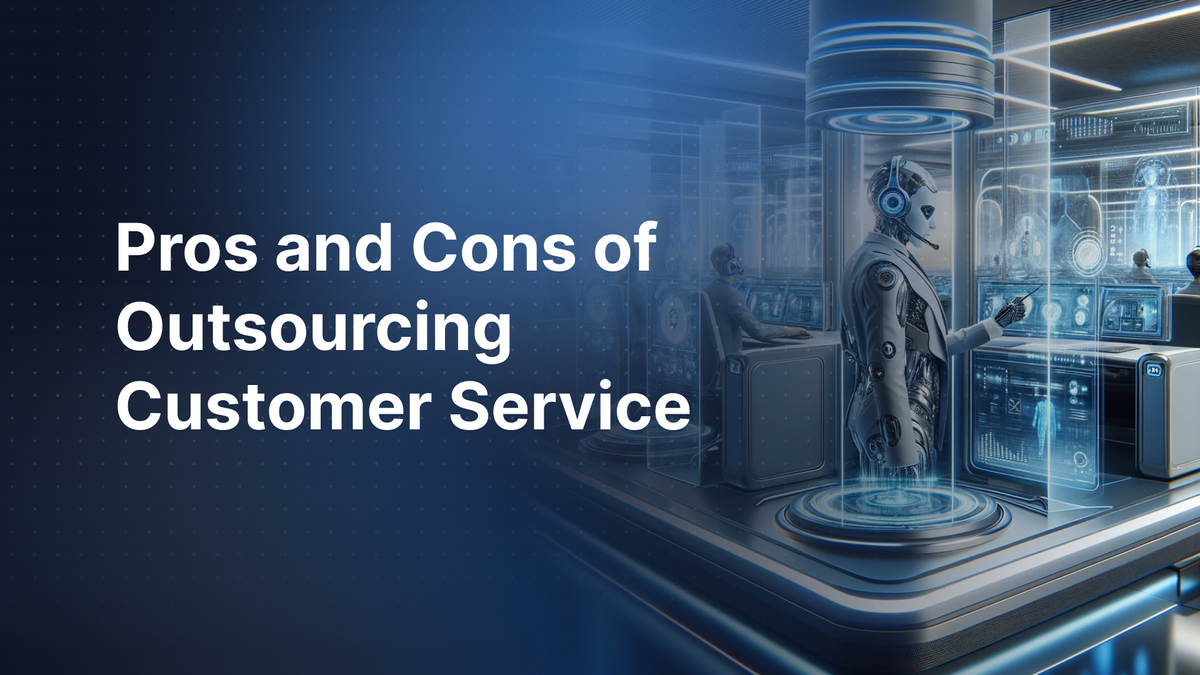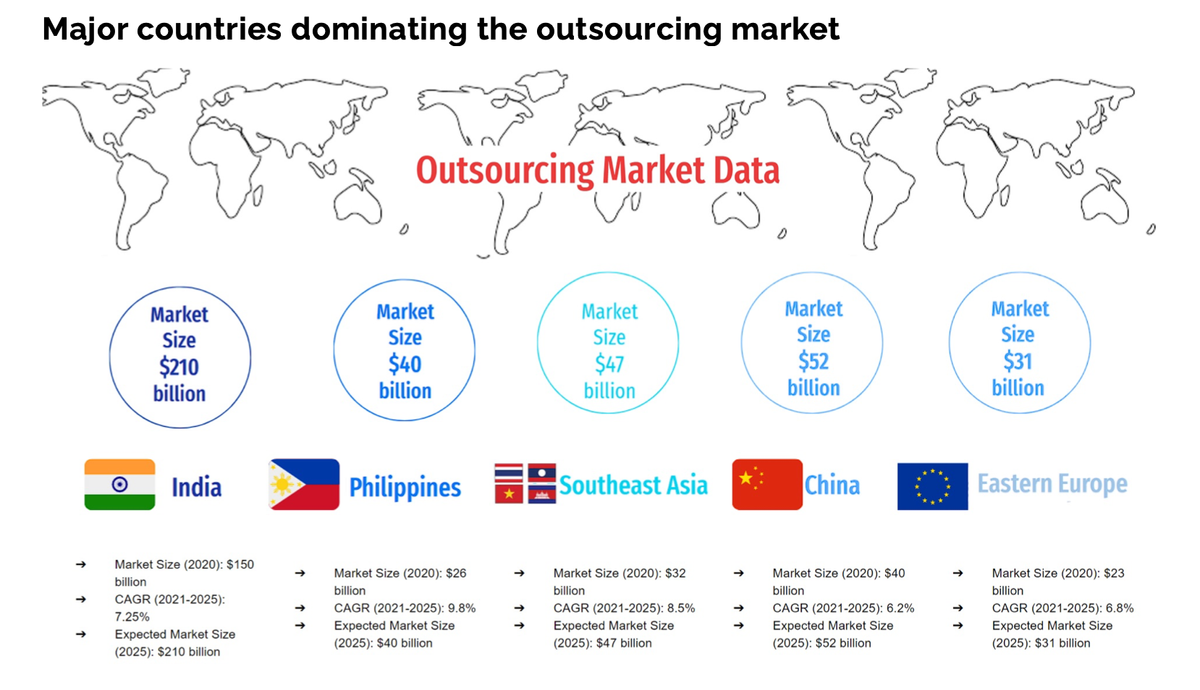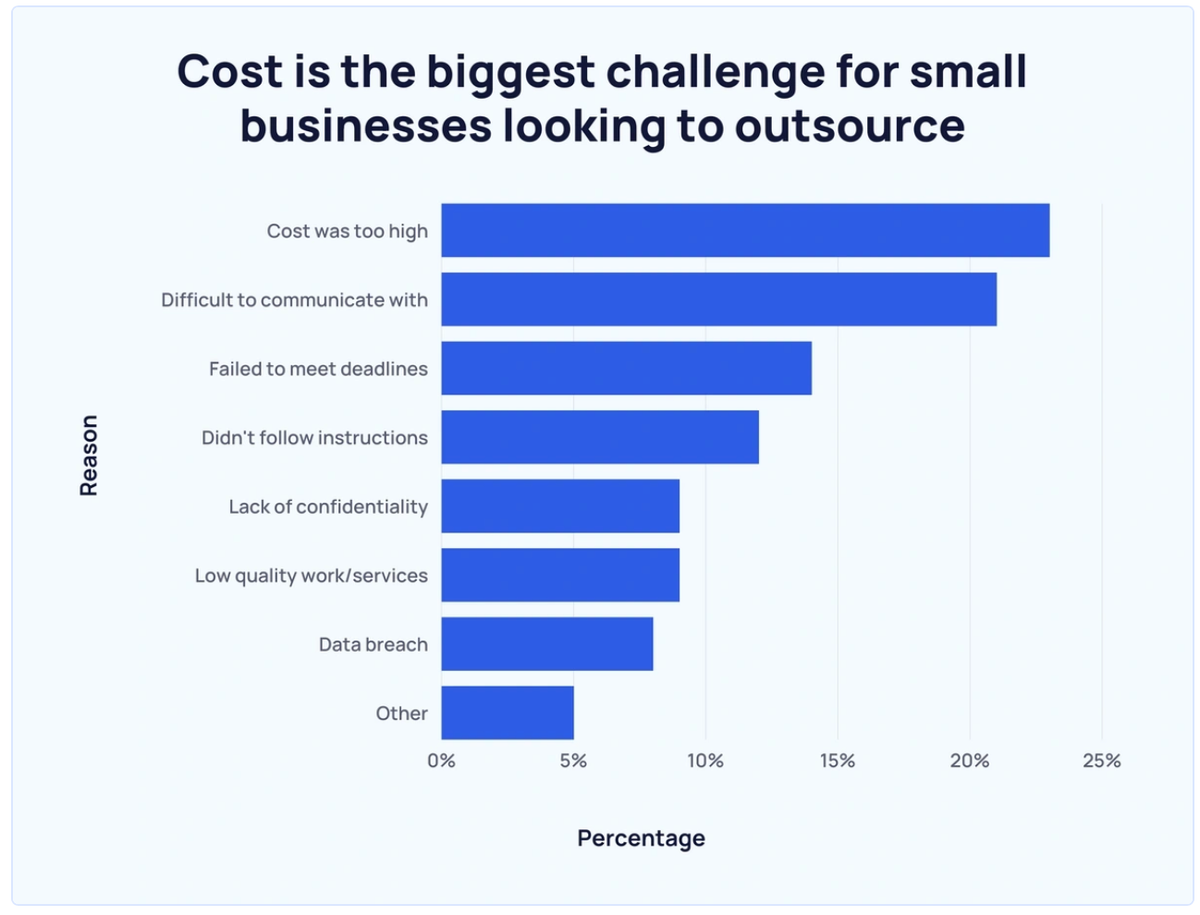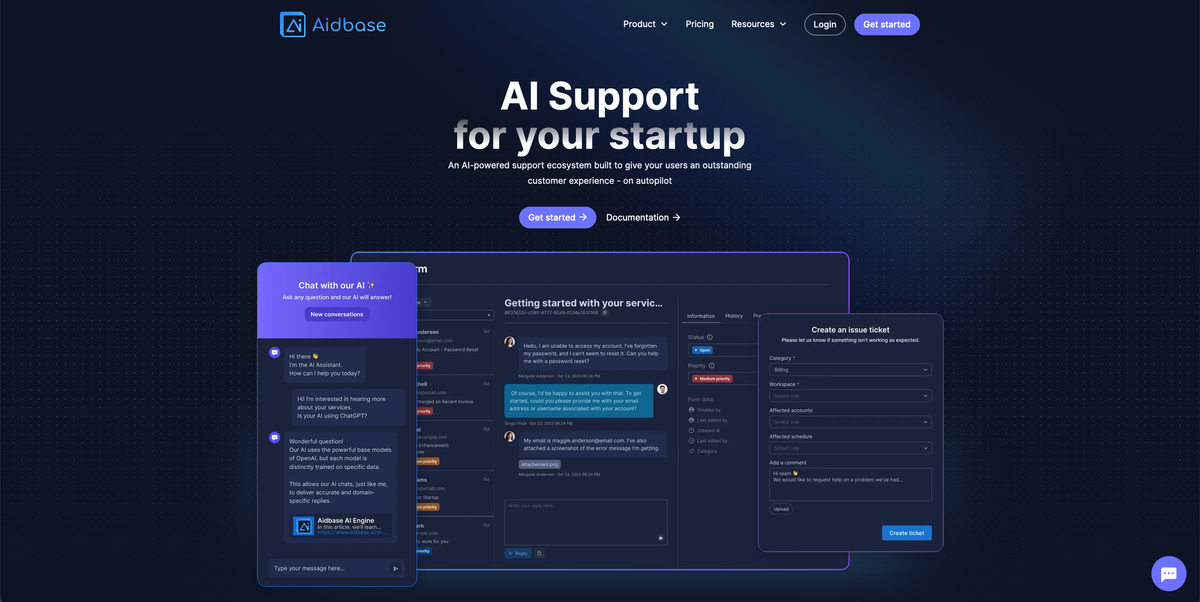Is outsourcing customer service helpful for your business? Well, read this gu...

Good customer service is an essential component of a successful business. As the first line of interaction between your brand and the customers, it has a direct and meaningful impact on the revenue and reputation of your business. According to a study, 91 percent of customers are more likely to make another purchase from a company that offers excellent customer support.
To maintain optimal levels of customer satisfaction, businesses choose outsourcing customer service as a helping hand. It is a widely adopted business practice that integrates your customer service with some of the most seasoned customer service professionals.
Let's look at the pros and cons of outsourcing customer support and how you can make the best use of it to achieve your business goals.
In simple words, outsourcing customer service is the process of hiring an independent organization to handle your customer service operations. This means instead of having an in-house team, people from a third-party setup or remote locations will take care of your business's customer support. This can include interacting with customers, live chat support, answering FAQs, troubleshooting technical problems, and other related issues.
Third-party customer service is usually an online or physical call center with customer support agents. These agents are trained in your company's products/services and work like a helping hand in providing proactive customer assistance.
In the last few decades, customer service has been significantly transformed with the help of outsourcing. Most of the time, businesses choose to outsource because of its cost efficiency, scalability, reduced workload, and maintaining a global presence.
Did you know that by the end of 2023, businesses have globally spent around $731 billion on outsourcing?
Customer service outsourcing offers plenty of modules you can choose from according to the specific needs of your business. We have shortlisted the four most common methods that most of the companies opt for.
It is probably the safest method of outsourcing customer service, but may increase your initial workload. By following a streamlined hiring process, you can select a remote customer support team of your own choice.
Start with creating a job post for your ideal candidate and hiring through different remote sources. You can use Fiver, Upwork, and similar forums for this purpose. Once you're done with the initial screenings and interviews, move on to the training.
The whole process can take several days or weeks until the selected candidate has developed a sound understanding of your products/services and business procedures. This is necessary so they can help the clients, answer their queries, and resolve their complaints. Try to familiarize your new members with other staff so they can work together as a team.
This method may work best for startups and small enterprises but could be challenging for established businesses. The whole hiring and training process could take a lot of time and increase the upfront cost. In case you need to expand your team, this entire process will have to be done repeatedly.
These are organizations that help other businesses with different services, such as customer support, marketing, HR, and others. Established enterprises usually go for outsourcing customer service through external agencies. They have teams of trained and experienced sales agents who can provide excellent customer support for your businesses.
Outsourcing agencies have in-house and online call center setups with people from diverse backgrounds and talents. Once they are trained according to your business requirements, you can fully trust them to handle your customer support operations.
Outsourcing customer service from a domestic agency comes with the ease of cultural familiarity with no language barriers. This enables the staff to communicate with customers more effectively and provide proactive customer support. It is also easy to conduct in-person meetings and trainings with employees who live in the same country as yours. However, local outsourcing is expensive, especially for countries in North America and Europe.

The most prominent benefit of international outsourcing is that it is always more economical than local agencies. The largest talent pool of outsourcing is located in Asian, African, and East European countries such as India, China, Philippines, Romania, and Tunisia, with India being the biggest outsourcing hub in the world. These regions have a low cost of living and a high number of English-speaking skilled professionals.
In the shared service model, customer support professionals are shared among several businesses. They are usually paid per minute or call according to their contract. Shared customer service teams answer inbound calls from customers and provide timely and efficient customer service within a company's SOPs.
Since there is no specialized training for shared agents, it is easy to quickly train new staff or onboarding other members into one team. Shared agents are a feasible option if you are outsourcing customer service for a startup or small business.
Dedicated customer service means staff who are exceptionally trained for your business, which means a workforce with an in-depth knowledge of your company's working culture and business process, hence a better customer experience. Dedicated outsourcing provides you with long-term collaboration opportunities with continuous learning and implementation of new technologies.
By now, you must have an idea of which method of outsourcing customer support suits your business. Now, let's look at the key benefits that come with this service model.
Running an in-house customer service department is expensive. An internal setup needs a proper infrastructure, management cost, and training with other benefits such as insurance. All of this can be reduced through outsourcing customer service. This can help you save:
With all the benefits mentioned above, it makes sense why cost reduction is the primary purpose of 70 percent of companies opting for outsourcing services, as per a report by Deloitte.
Startup staff usually juggles between different roles. Along with responding to customer queries, the team has to take care of sales, marketing, and other profitable tasks. All of this workload can make it difficult to maintain effective communication with customers. Outsourcing customer service can help you focus more on your long-term business goals, such as research and development, marketing, or lead generation.
When you know that you have a reliable team of professional people who can efficiently deal with your customers, you can dedicate more time to productive tasks that need critical thinking and advanced levels of productivity.
A very common challenge for retail and e-commerce businesses is maintaining the quality of customer service during Christmas, New Year, and Black Friday sales with limited staff. Peak times are an excellent opportunity to generate revenue, but also come with an insane surge in customer support demands.
Outsourcing customer service during peak season is an effective strategy to improve sales and build strong relationships with customers. Scalability allows you to quickly hire new trained staff without the hustle of the hiring and training process. In case of a sudden increase in customer queries, you can onboard part-time new members. Similarly, when the surge goes down, additional staff can be easily laid off without offering any extra compensation.
Customer service is a 24/7 job. Some businesses may need to assist their customers on Sundays and after business hours. Outsourcing customer service gives you the flexibility to customize the customer support as per your business requirements.
You can choose to outsource complete customer service operations or a chunk of it, such as email outsourcing, live chat support, and inbound or outbound calls. Many outsourcing agencies provide 24/7 support with flexible working hours and multilingual service facilities. Hence, if you have a global business audience, there is no need to worry about maintaining a stable communication channel with your customers.
Outsourcing customer service provides a lot of benefits for your business, such as cost-efficiency, scalability, and flexible services. However, it comes with its own set of challenges that you should figure out before proceeding with the outsourcing process.
Maintaining an optimum level of quality control could be a challenge if you are outsourcing customer service. An outsourced team works from remote locations, which means there is no direct manager who can monitor quality control processes consistently. To tackle this, always keep the communication channels open and conduct regular meetings.
Your customer service team should display a deep level of understanding about your company's products, SOPs, and business procedures. This is necessary to maintain a consistent brand reputation regarding return, exchange, and refund policies. To avoid any mishaps, constantly collaborate with a reputable and trusted agency that holds a sound reputation.
Every business wants their customer support staff to be the front-line representative of their brand, but this may get compromised if you are outsourcing customer service. Think of a shared customer service agent who is dealing with someone complaining about a malfunctioning microwave oven and then explaining the credit card refund process to another customer the very next moment and so on. Will they be able to achieve the required level of professionalism?
Businesses have confidential customer data in their records. From phone numbers to addresses and personal and bank details, there's a lot of confidential information customers trust them with. To maintain this trust, organizations should thoroughly evaluate the past profiles and details of the outsourcing agency and their employees, making sure there is no history of data hacking or privacy breaches.
It is a highly sensitive matter, especially if a business is dealing with critical information such as healthcare, finance, or legal issues. Only in 2021, did 33 percent of third-party data breaches happen in the healthcare sector, the highest percentage ever.
Customer outsourcing is famous for being cost-effective, but that's not entirely correct. As you proceed further, there are multiple hidden costs that you will have to pay for outsourcing customer service.

Outsourcing customer service could be a smart move for your business, but it needs proper planning beforehand. While enjoying the benefits, prepare yourself to tackle challenges such as quality control, privacy issues, and maintaining accountability to provide the best customer support.
Think of a mother hiring a helper to look after her child, the challenges she is struggling with, and all the pros and cons she weighs while still hoping that it turns out to be the best decision for her child.
Your business is also your brainchild and should be dealt with the same sensitivity. Here are some critical aspects you should thoroughly work on before outsourcing customer service from a third party.
Set your goals and priorities regarding customer service before approaching an outsourcing company. Here is how you can do it.
Having your requirements, goals, and priorities aligned together can help you create a roadmap for your customer support outsourcing.
There are more than 1000 customer support outsourcing companies working globally. Whom you want to work with depends upon the individual needs of your business. There are all sorts of agencies; some work with local agents, and others outsource globally. Some platforms cater to only specific industries, such as E-Commerce or healthcare. Similarly, every platform has different technologies and CRM systems.
Before choosing a platform, do a background check about their past projects. Does their portfolio align with your brand? Also, what are their work ethics regarding data security and customer privacy?
It's important to choose the right platform for outsourcing customer service, but establishing a transparent work contract with your partner is critical. Discuss with your outsourcing partners how much you will be charged at the start, end, or during the contract. Clearly define the billing invoice and dispute resolution terms and conditions.
In case you are going for international outsourcing, it's good to familiarize yourself with local labor laws or living expenses of that region so you can ensure that your team members are being paid well on time and there is no exploitation.
By considering the elements, you can choose an outsourcing partner that best fits your business needs and your brand's vision.
Technological advancements and the impact of AI are continuously evolving the dynamics of customer service. AI automation can handle the majority of customer service tasks with the help of AI chatbots and conversational AI apps.
These applications are designed to provide faster, more efficient, and proactive customer support, especially for fast-paced businesses like E-commerce and retail, where 63% of organizations have already employed AI automation in their customer service.
AI chatbots are software and computer applications used in customer services. They are designed with NLP, which enables them to interact with customers in an engaging and conversational manner. AI chatbots are extensively utilized for answering customer queries, providing information about products/services, and handling primary customer complaints.
Conversational AI is a system of advanced applications; they are also developed with NLP and backed with internal data but work in a more progressive manner than chatbots. A user can send their query in a voice format by using their preferred language. AI applications understand and process these queries to generate an appropriate response.
AI automation has completely changed the way customer service works by enabling 24/7 service, cost-effective operations, and assisting businesses with customer queries.

AI applications assist businesses in providing 24/7 customer support without a break. This is highly beneficial for a company with a global audience, so people can reach out to customer service without worrying about the time zones.
A single AI chatbot can handle the workload of hundreds of human agents. There is no longer waiting for customers for their basic queries such as product information, order tracking, and FAQs. Chatbots can resolve these issues quickly, in a friendly manner, and improve customer satisfaction.
AI automation usually has a one-time upfront cost that comes with the designing and development of systems, but it is still far less than outsourcing customer service. This is the exact purpose of automation; once things are streamlined, they can work on their own without minimal intervention.
Using AI and outsourced customer service are both effective strategies, each serving specific purposes to improve your customer support operations.
Customer service outsourcing gives access to an international talent pool of skilled agents. These people are capable of providing specialized services in specific industries with a sound experience in the background. The most significant benefit of human agents is the 'personal or human touch' to customer service, which is the core of any successful business.
On the other hand, AI-powered tools such as chatbots and virtual assistants can handle a massive chunk of routine tasks and provide consistent customer service. Since they are automated systems, there are no issues of quality control nor a constant need for human supervision. The customer data is highly protected with a lesser chance of breaching and hacking.
Analyzing all the pros and cons of both systems, it's common for businesses to assume that customer support outsourcing will be entirely replaced by AI automation, but is this a sustainable solution?
The whole discussion of AI automation vs. outsourcing is not about which one is better but rather how these two technologies can join forces to provide a holistic customer experience.